
ENCAPSULATING INCLUSIVE GROWTH
NTPC
Being the largest power utility in India, NTPC has focused on energizing India’s overall growth. Adhering to its vision, NTPC’s activities have focused on health, education, eradication of poverty, hunger & malnutrition skill development, income generation targeting farmers, women empowerment, Swachh Bharat, etc. They aim at promoting a healthy living with proper sanitation and safe drinking water. Guided by the mission, “Develop and provide reliable power, related products and services at competitive prices, integrating multiple energy with innovative and eco-friendly technologies and contribute to the society,” they envision empowering India’s growth. Their commitment to inclusive growth and sustainable development is evident through their development projects and a comprehensive approach towards uplifting the neighbourhood of its operations.

Daily, 650 tonnes of solid waste is converted into manure at Karsada plant, Varanasi,Uttarpradesh
Among the diverse range of projects it covers are infrastructural development, education, health and sanitation, capacity building and gender empowerment. All their CSR projects have been customised in accordance with the local requirements; need Assessment Surveys act as a guide while Village Development Advisory Committee, Rehabilitation and Periphery Development Advisory committee, public representatives, etc. help in understanding what the community requires.

The financial growth of farmers in Jhanor, Bharuch, Gujrat, can be attributed to the expert technical suppport provided by NTPC
Waste disposal and management is a perennial problem faced
by most of the cities in India. Booming population coupled with
urban migration has made finding solutions even more difficult.
In an effort to mitigate this problem NTPC has come up with a 2
step process which targets the collection as well as the disposal
of the waste. Three automated waste collector machines have
been provided to the Varanasi municipal corporation for ease of
waste collection from the road sides. The machines are equipped
with sweeping and suction systems to ensure fast and effective
cleaning of the roads.
The waste thus collected is transported to the Karsada plant,
which undertakes the process of converting the solid waste into compost and
energy.

The Sevakunj Ashram Chapki (NTPC- Rihand) supports the growth of many active students such as these archers who have even represented the institution in international competitions
The Karsada plant collects waste from 90 wards of the city, which accumulates, to around 650 tons of solid waste per day. 60 labourers are employed to manually pre sort and lime spray- which acts as a disinfectant and odour controlthe waste which is then dumped into the automated machine which proceeds to turn the solid waste into compost using a methodical procedure. The solid waste that cannot be turned into compost is separated and used as a landfill at the designated area of the municipal corporation. The rest of the waste goes through a rigorous process where it’s refined, crushed and powdered to be made into compost. The plant can successfully deliver 30 to 50 tons of compost per day.

NTPC provides infrastructural assistance to numerous schools according to the requirement
The compost, hence made, is distributed through their partner agency, fertilizer companies, at a rate of 3500 Rs per ton. The compost, moreover, is sold to nearby farmers who come and collect it from the project sight at a subsidized rate of 1Rs per Kilogram. In addition to this, there is also a similar upcoming plant set up by NTPC in the same area which focuses on converting the solid waste into producer gas through which electricity is generated. Pre-sorted waste will go through a 3-step filtration system and is converted into producer gas- the type of gas that cannot be stored- which will be used to run the power plant itself to generate the electricity.
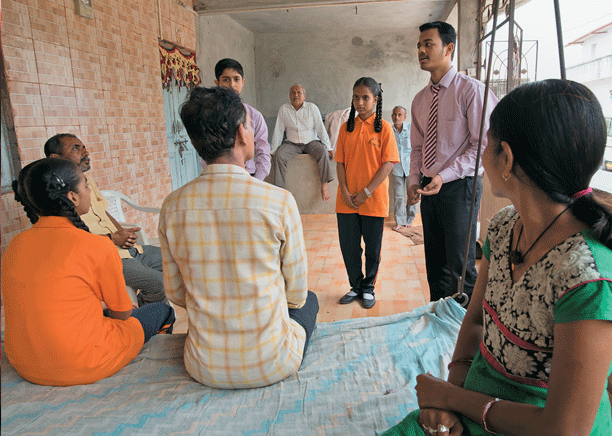
Student-led 'quality circles' have taken up the responsibility of spreading awareness on health and hygiene in the domestic circle at Jhanor-Gandhar
Access to education is one of the primary focuses of the CSR activities of NTPC. In Vindhyachal Project, Singrauli district, Madhya Pradesh: NTPC, since 2013/14 has provided for the boarding, lodging, school fees as well as the entrance coaching fee of 30 selected students of the district per year. A district wide talent search was conducted every year to select the 30 brightest students of the district who fall under the below poverty line. These students are then looked after by NTPC; enrolling them in a 2 year medical/engineering coaching class in a tie up with reputed coaching institute. The onus is on providing quality education that would have been otherwise unattainable for the students due to their poor financial background. Further, the students who are able to get into reputed government institutes are also provided with Utkarsh scholarship-intended to cover their educational costs- which comes around 90 thousand per year. NTPC spends around 65 lakhs per year on covering the boarding and schooling expenses of the students.
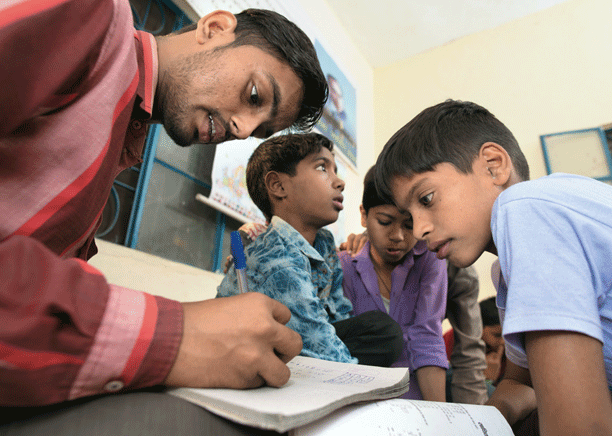
Volunteering after work, the NTPC employees have bestowed qauality coaching to aspiring students at Rihand (UP)
At Vindhyachal, engaging an organization working on alternative methods of education at the primary level in 15 Govt. schools, is being funded/ implemented by NTPC in the Singrauli district (MP). Through this, a film based teaching method is employed in which the students are introduced to difficult topics in maths, science and other fields through engaging and immersive videos. By teaching through animated videos and games the children naturally develop a curiosity about the subject; Moreover, since the topics are of a high quality, and tailor-made for NCERT books, the teachers themselves learn a lot from the quality content which overall improves the academic atmosphere.
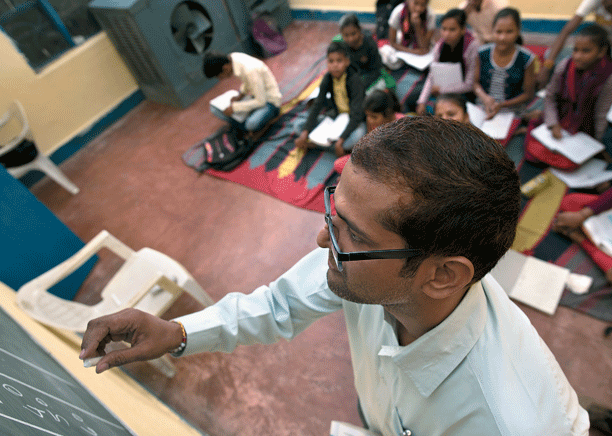
Volunteering after work, the NTPC employees have bestowed qauality coaching to aspiring students at Rihand (UP)
At Rihand, in a truly unique and commendable utilization
of resources, NTPC has facilitated a knowledge sharing
between its highly qualified employees and the children from
the surrounding areas. Volunteering during their leisure time,
NTPC employees are providing coaching to around 60-70
students who cannot afford quality coaching. The batches
have been divided into two: one, consisting of the students
in the primary schools, and two, consisting of the students
who have passed matriculation. The coaching objectives
towards first batch, consisting of smaller children, are aimed
at procuring their admission to the Navodaya Vidyalayas while
the second batch is more of an entrance coaching oriented
one that focuses on the 10th/ 12th pass students. Procuring
admission to the Navodaya Vidyalayas and reputed polytechnic
and engineering colleges will help the students in ensuring a
quality education while also improving their overall academic
standard. The NTPC Rihand employees have successfully created an atmosphere
which fosters the volunteerism and
giving back to the community approach.
In Jhanor, district Bharuch
(Gujarat), NTPC has facilitated the
creation of ‘quality circles’ in the schools. ‘Quality circles’ are
basically groups created to debate, discuss and tackle social
and academic problems. Each circle consists of 10-12 student
members, which also consist of a teacher. The objective of
the quality circle is to promote the incubation of genuine and
innovative ideas- relying on the inherent creativity of childrento solve
common problems. The initiation of such dialogues
also helps to create an innate concern for such topics as health
and hygiene; while also helping to initiate the same dialogue
in the homes of the children. At Ramagundam, district
Peddapalle (Telangana), an interesting part of the education
related CSR activities is the night school where as many as
2000 adult illiterates are taught by local youngsters who have
attained good degrees. In one of the villages, Malayapalli, there are five
centers and the adult ones are taught alphabets.
There are about 20-40 students in each class, in 4 villages and
total 30 centres are in operation.
papaya cultivation by farmer in Ramagundam
NTPC has been aligned with the Swachh Bharat mission of
the Indian government in promoting cleanliness and hygiene
from the villages to the cities. In Anta, Rajasthan, NTPC has
supported the Swachh Bharat mission through the construction
of toilets in 4 villages, including 176 toilets in Ratariya and 117
toilets in Tamkheda. Ratariya village, especially, has been opendefecation
free, mainly due to the efforts of the NTPC-Anta.
In addition to the construction of toilets, the people were also
provided awareness regarding the importance of using toilets
through street plays and other mediums. These toilets were
constructed for each household of the village. Considering the
cultural background of the villages which have held the belief
that one should not cook food or excrete inside the premises
of their home; making the villages open-defecation free has
been a major achievement.

With the right technical advice, farmers in Rihand, Uttarpradesh, have found success with non-traditional crops
“Initially it was difficult to get them to use the toilets. The
elders complained that it’s hot inside” says Mukeshi Bhatt,
social worker who is associated with this work. “They were
habituated with open- defecation; it took them time to get
accommodated. We targeted the children and the women,
and cultivated the habit in them”, she continued.
At Vindhyachal station
in Singrauli (MP), the mobile health
van operated by NTPC, does regular visits in the rehabilitated
and resettled villages in the area. The van is equipped with a
generator and basic health check up facilities. The staff consists
of a doctor and a lab technician; both of whom are always on
board. The van visits 24 villages in a month according to a pre
fixed schedule; distributing medicines free of cost, conducting
check-ups and referring to other hospitals if need be.

Cows produced through artificial insemination have shown to be healthier and give-off more milk at Sipat ( Chattisgarh)
At Jhanor in Bharuch, Gujarat, the farmers were given training and even provided free of cost soil testing. Again, the onus here was to guide the farmers into incorporating modern techniques such as drip irrigation and intercropping. Encouraging farmers to abandon their traditional practices for modern techniques took some time in succeeding as there was an initial reluctance from their part. The few farmers who were on board have enjoyed a massive success in their crops and supplemented their income. Opting to plant papaya and other mix crops like onion and ginger have worked wonders for them commercially.
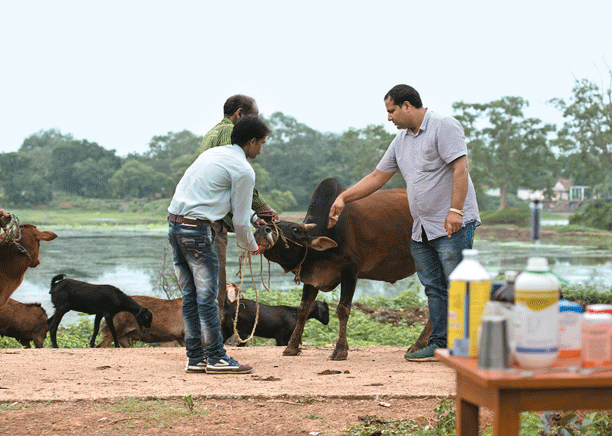
Multiple animal health camps are organized every month where vetenerians treat sick cattle at Sipat ( Chattisgarh)
Similarly, in Rihand, Sonebhadra, Uttar Pradesh, NTPC had trained 40-50 farmers on well researched agricultural techniques and intercropping methods. Still practicing traditional techniques of farming, the farmers of Rihand could not utilize the full potential of their lands; more accurately, they were not aware that their land could produce more or better yield. On being provided the training, a few farmers have shifted to banana cultivation mixed with intercropping which has seen their income go as high as three times what they used to receive. Apart from providing the initial training, NTPC also held regular interventions to advise the farmers on the best farming practices.
In Ramagundam, Telengana, young women are given coaching for police and armed forces recruitment
NTPC collaborates with the centre for agricultural development to provide knowledge intensive skill training to the villagers. By means of providing skill training the organization has been able to create sustainable livelihoods for many of the villagers.
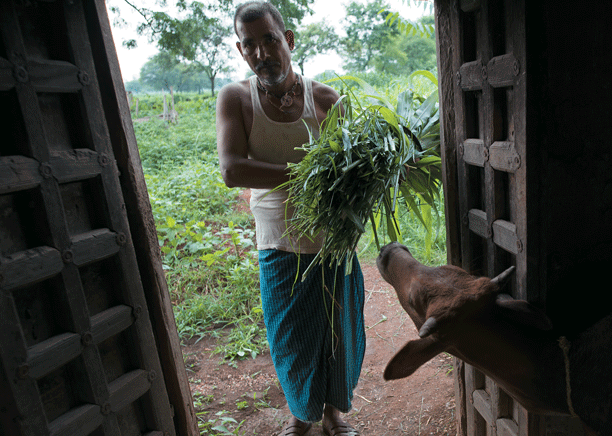
Improved quality of fodder for cattle to increase the milk production at Sipat ( Chattisgarh)
In Sipat, Bilaspur, Chhattisgarh: The state popular for its tribal population, is also known for agriculture and cattle breeding.Keeping in mind the occupation of major villagers, NTPC has been implementing integrated livestock development centre and fodder multiplication centre in 31 villages in & around Sipat Plant.Artificial insemination is also done for which around Rs156 lakhs were allotted, covering 31 villages. One of the cattle bearers, Bahurilal Sahu owns five cows and two buffaloes. His cows were inseminated and the calves they produce have improved in their health and all other aspects. “The fodder provided by them has also been a great help. While two months ago cows would give 5 litres milk a day, they can produce about 7-8 litres now, which is increasing my income,” he said, that too only with improved fodder.The fodders provided mainly includes maize and sorghum and to keep a regular check on all the cattle, three-four animal health treatments camps are organized every month where vets check the cattle and treat the sick ones. To boost the health and milk production of cows, azolla seeds are given to the farmers.
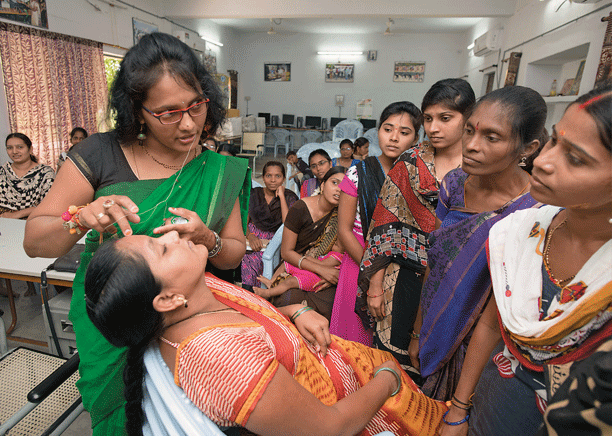
Beautician courses are a popular choice among the women of different ages at Vindhyachal, Singrauli ( MP)
The children are provided coaching, along with material assistance like track suits and shoes. One of the beneficiaries, Vanaja, is a police constable. “My parents are milk vendors. I studied in government schools and managed a scholarship for further studies. I was jobless after completing my MBA, I came across the training programme so I enrolled myself in it. I have always wanted to wear that uniform and do something for the society. Of course, people had their own perception and discouragement came along but I stayed resilient and here I am!” said the 25-year-old officer from Khajipalli village.
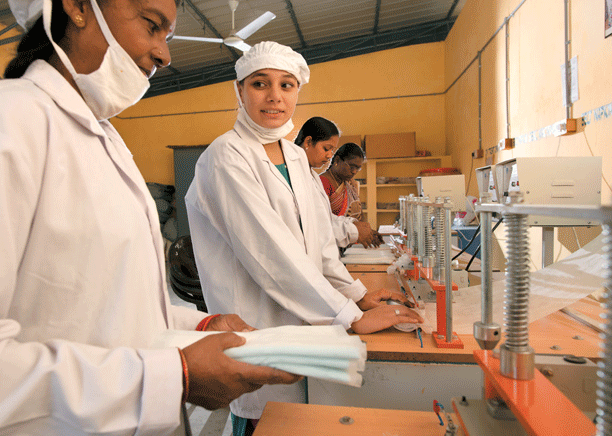
Women are trained to make sanitary napkins with the help of cottton and synthetic materials at Ramagundam (AP)
Within the span of vocational training at Ramagundam,
a remarkable activity has been manufacturing sanitary
napkins. Within the premises of NTPC township, fivemember
women team makes sanitary napkins with the help
of cotton and synthetic. Yasodha, 53-year-old widow from
a village nearby, has had an education only up to standard
eighth but through the programme, she has been managing
four thousand rupees per month.
“Initially we support them with raw materials that come
from Jayshree Industries and provide them three-day training.
These women are chosen from backward communities with
no support and quite surprisingly, they are extremely hardworking.
They prepare 400 pairs of napkins a day which we
distribute on a timely basis in all nearby villages through the
district administration,” added NTPC representative.
The vocational training programme also includes pickle masala
making unit, running canteen in Jyothika club, running beauty
parlour, tailoring Unit in NTPC Shopping complex, saree tie and
dye unit in a PAV - Laxmipuram and waste paper recycling unit
with eight women which is still in progress.

Construction of water reservoirs have quellled the scarcity issues in drought-prone areas at Rihand, Sonebhadra (UP)
NTPC has created several ponds and water catchment areas in the Anta region in a bid to pool the running water, and thereby recharging the ground water level of villages around. Rain water harvesting is an effective method of water conservation in a drought prone state like Rajasthan where the soil allows the water to run off. The hence constructed ponds are built for the purpose of ground water recharge and apart from the cattle no one is allowed to use the water for any other means as such rapid consumption will defeat the purpose of storing water. Construction of water bunds like the ponds allows the water to seep through into the soil and thereby recharging the ground water level, providing a sustainable solution for droughts. The above are the some NTPC locations and activities which Outlook Team visited and overwhelmed with the progress. NTPC is doing excellent work under CSR in almost every CSR domain area at all its locations spanning in many districts, states of the country.




